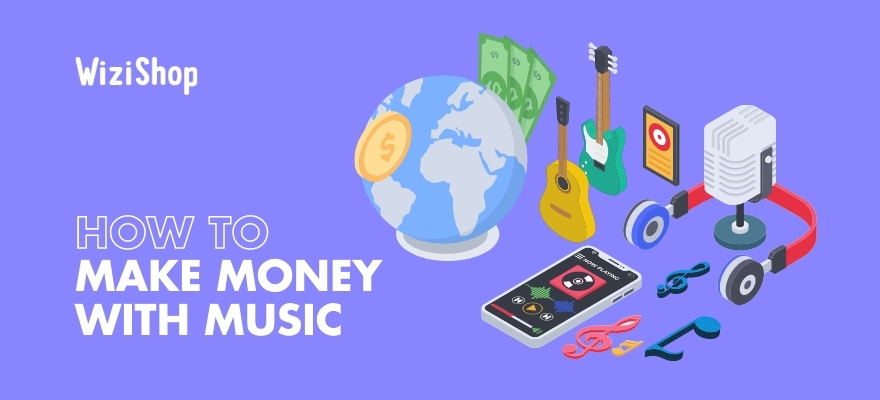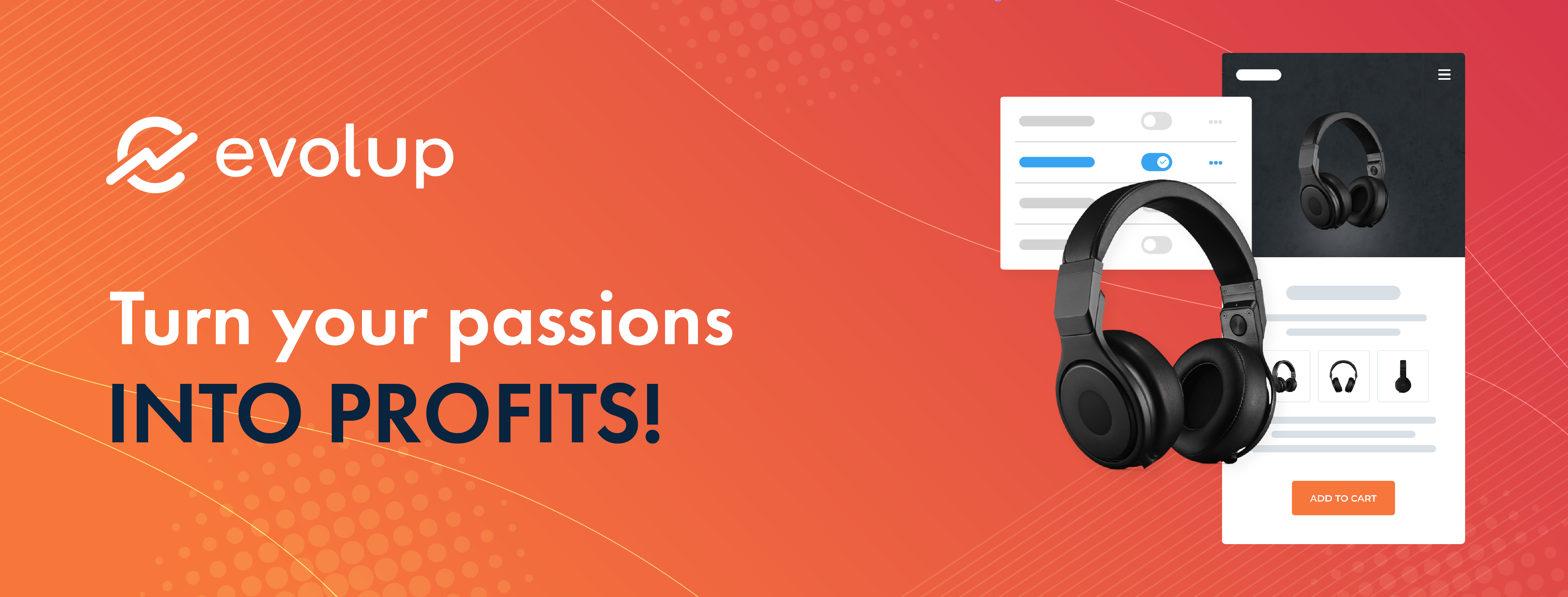Are you a passionate musician who wants to start a musical career? Have you written a song and want to develop your artistic talent?
Whether you’re part of a band or are a solo artist, it’s possible to make a name for yourself in the industry, provided you pull the right levers and work hard to get there. To help your dreams as an artist come true, make the right decisions and surround yourself with the right people.
How do you make money with music? Although there are no hard and fast rules, here are some great ideas for how to generate income, regardless of if you’re a skilled musician, proficient songwriter, or simply a music enthusiast!
Table of contents
- 1. Live performances
- 2. YouTube channel
- 3. Merchandise sales
- 4. Sync licensing
- 5. Streaming royalties
- 6. Digital downloads
- 7. Patreon or fan subscriptions
- 8. Music lessons
- 9. Session work
- 10. Beat sales
- 11. Affiliate marketing
- 12. DJing
- 13. Crowdfunding campaigns
- 14. Twitch
- 15. Songwriting for others
- 16. Music libraries
- 17. Podcast music creation
1. Live performances
Many years ago, concerts were a way to promote the musical creations and albums of musicians. Now, the place of the concert has changed because the sale of albums has been completely turned upside down with the internet and streaming sites.
Today, concerts and festivals have become one of the main revenue streams for artists.
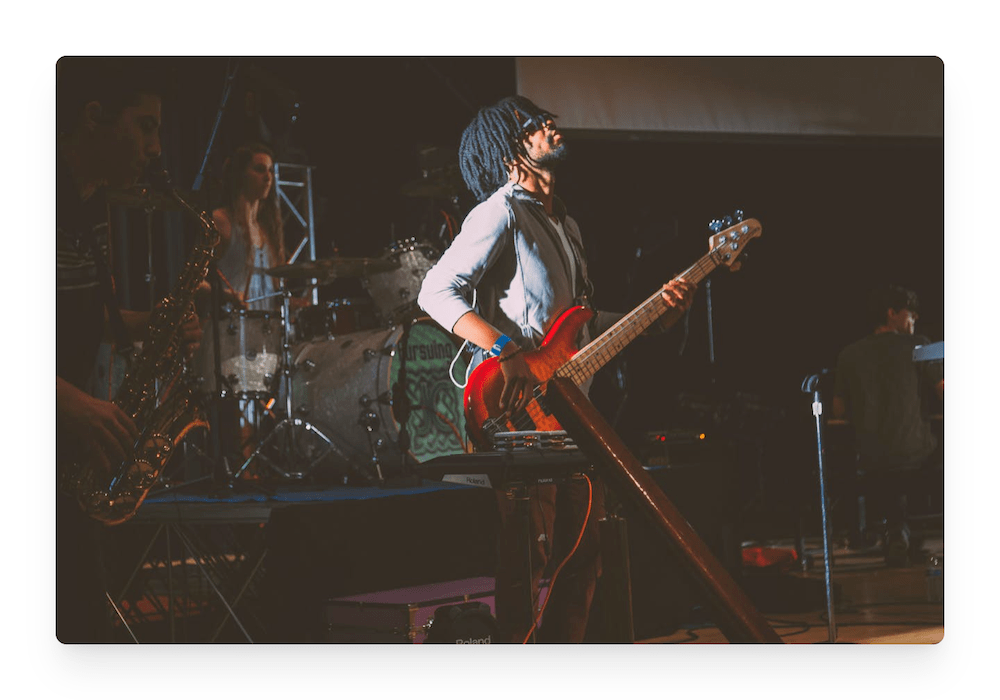
Photo by Craig Adderley
In addition to being remunerative, doing live shows makes it possible for artists and musicians to build a community of fans to evolve and reach more and more users listening to their style of music.
Performing on stage in different establishments, in different cultural places, is a way to reach different audiences, to attract more and more people, and finally, to be able to sell your music to a conquered public.
2. YouTube channel
Another great way to begin making money with your music is to launch your own YouTube channel.
With this method, you can generate income through ad revenue, channel memberships, Super Chats (during livestreams), and by joining the YouTube Partner Program once you meet the requirements. In addition, you can earn from affiliate links, sponsored content, and by promoting your own music, merch, or Patreon.
Source: Maneli Jamal - Acoustic Guitarist
Don’t hesitate to share various kinds of content related to your musical endeavors, such as music videos, lyric videos, behind-the-scenes footage, tutorials, and live performances, to keep fans engaged. Here are a few tips to optimize your efforts on YouTube:
- Use eye-catching thumbnails, relevant tags, and strong titles to boost visibility on your YouTube channel.
- Post regularly and interact with your audience in the comments.
- Monetize cover songs by licensing them properly, and always credit collaborators.
- Try YouTube Shorts to gain exposure quickly.
- Promote your channel across your other social networks and include links in video descriptions to drive traffic to your merchandise and streaming platforms.
3. Merchandise sales
You can also consider creating merchandise and derivative products in order to sell them to your fans on the web or during your concerts: another efficient method to obtain money with your music.
As an artist or musician, you can sell merchandise like t-shirts, mugs, hoodies, hats, posters, stickers, and physical copies of your music (CDs, vinyl, tapes). Custom items like signed lyrics, exclusive artwork, or limited-edition drops create excitement.
At shows, set up a visually appealing merch table, take card payments with a mobile reader, and engage with fans directly.
Online, use a platform like Wizishop to sell merchandise directly on your online sales site. Once your album is recorded, you just have to start selling it on your online store to offer it to your customers/fans. You can additionally opt to offer a variety of other items related to your music for sale via your ecommerce site.
When it comes to earning income with your music, there’s no limitto how much money you can make with your ecommerce site!
Besides being able to sell all kinds of different products, with WiziShop, you benefit from 400+ ecommerce features, more than 50 SEO optimizations, personalized support with Business Coaches to help your business succeed, and free marketing and ecommerce training included in your subscription. What’s more, you’ll have access to our powerful AI tool for generating all kinds of text content for your site in mere seconds!
From $24.90 per month, create your online store and earn money in ecommerce by selling your artistic creations, including your song catalog, merch, and other digital or physical products, to the largest number of people possible.
Start your ecommerce business and take advantage of a 7-day free trial today!
Try WiziShop free for 7 days
THE EASIEST NO-CODE ECOMMERCE SOLUTION✅ No credit card required
✅ Access to all features
✅ No commitment
4. Sync licensing
Sync licensing is when you give permission for your music to be used in visual media—like TV shows, movies, commercials, or video games.
It’s one of the most lucrative ways to make money with music because companies often pay upfront licensing fees... Plus, you can earn ongoing royalties. It also gives your music massive exposure to new audiences.
Case in point: Madonna’s “Material Girl.” While it was an undeniable hit when it first came out in 1984, it being featured in Season 2 of the Bridgerton series on Netflix as an orchestral version brought the tune new success on the charts, taking the #1 spot on the TikTok US Top Tracks chart in 2022!
Source: Still Watching Netflix
To get started, you’ll need high-quality, original music and a way to license it legally (make sure that you own all rights or have permission from collaborators). Then, sign up with a sync licensing agency, music library, or pitch directly to music supervisors.
Having instrumental versions of your tracks and clear metadata can also boost your chances. It’s competitive, but one sync deal can be a serious game-changer!
5. Streaming royalties
As far as streaming services are concerned, Spotify or Deezer, for example, will host professionally recorded songs to provide users from all over the world quality music, which they can save in their playlists.

Source: Spotify
Keep in mind, however, that the better your content, the more likely you are to attract new listeners. Also, the presence of your music on Apple Music, Spotify, Deezer, or other streaming services can serve as a guarantee of the quality of your work.
Note that each streaming service pays artists from the first listen: it’s a more efficient way to make money with your music online. You’ll be paid royalties for each time that your tunes are streamed by people using the service.
Nevertheless, it can be tough for a musician or artist to earn a living from streaming royalties alone, as the revenue they receive per stream is generally very low. For this reason, many people supplement this income in other ways, such as by selling merch online and/or offline.
6. Digital downloads
Digital downloads are a solid way to make money with music because they allow artists to sell their songs or albums directly to fans with minimal overhead. Unlike streaming, where payouts are small per play, downloads typically generate a higher one-time income per purchase.
This model gives musicians more control over pricing and bundling options (e.g., including bonus tracks or digital booklets). Selling through platforms like Bandcamp, iTunes, or your own website makes your music easily accessible worldwide.
To succeed, make sure your tracks are high-quality and properly tagged with metadata. Consider offering exclusive content or limited-time deals to encourage sales.
Building an email list and promoting releases through social networks can help drive traffic. Lastly, always engage with your fans—people buy music when they feel connected to the artist!
7. Patreon or fan subscriptions
Patreon or fan subscriptions allow you to earn steady, monthly income by offering exclusive content to your most loyal supporters.
Instead of relying on one-time sales or streams, you can build a community that directly funds your creative work. It involves creating tiered membership levels where fans get perks like early access to music, behind-the-scenes updates, live Q&As, custom music, or merchandise discounts.
With this method, you’ll want to be sure to be consistent, regularly posting content and engaging with your subscribers. It’s also essential to prioritize authenticity and give fans a reason to stay invested in your journey.
Promote your Patreon on social networks and during shows, and think about offering special incentives to new patrons. It’s not just about money—it’s about deepening the artist-fan relationship and building long-term support.
8. Music lessons
Whether online or in person, lessons provide steady income and let you share your passion while helping others grow.
You can teach instruments, voice, music theory, songwriting, or production—whatever fits your strengths. It entails planning and making lessons tailored to each student’s level and goals and building a schedule that works for both you and your clients.
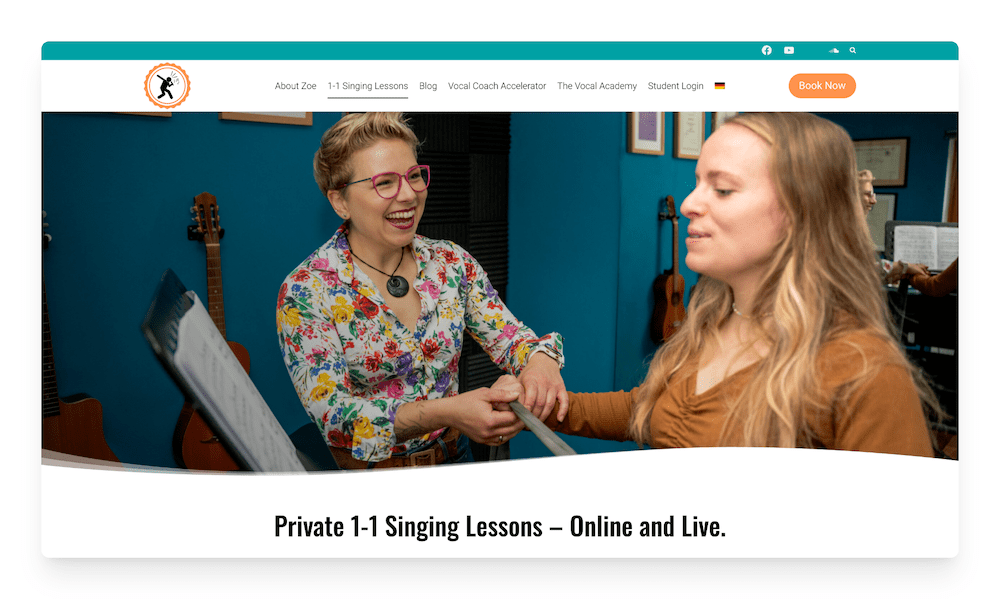
Vocal coach Zoe Stibi
To get started, advertise on social media, local forums, or teaching sites like Onlinemusiclessons or Lessonface. You might opt to offer a free or discounted trial to attract students. Be patient, encouraging, and flexible in your teaching approach.
If you want to take a more general approach, you can create online courses as digital products to sell on e-learning platforms such as Udemy, Thinkific, Skillshare, Kajabi, or Teachable.
Keep in mind that with the WiziShop ecommerce solution, you can also sell digital products like online courses directly via your online store, taking advantage of all the features and services the platform has to offer!
Try WiziShop free for 7 days
THE EASIEST NO-CODE ECOMMERCE SOLUTION✅ No credit card required
✅ Access to all features
✅ No commitment
Over time, word-of-mouth and referrals can grow your student base. Plus, teaching sharpens your own skills and deepens your understanding of music.
9. Session work
If you’re flexible and like variety, consider getting into session work to boost your income. Session work involves being hired to play, sing, or produce music for other artists, bands, or projects—either in the studio or remotely. After building a solid reputation, you can look forward to steady gigs.
You might record guitar tracks, lay down vocals, add keys, or contribute to a film score or commercial. Musicians doing session work are paid per project, with the pay sometimes also including royalties or credits.
Sound good to you? Begin by creating a demo reel showcasing your skills, and list your services on platforms like SoundBetter or Fiverr.
Network with local musicians and producers, and be professional, reliable, and easy to work with—word travels fast. The more versatile and efficient you are, the more likely you’ll get hired again or recommended to others.
10. Beat sales
Selling beats is a profitable and scalable way to make money with music, especially for producers. You create instrumental tracks and sell them to artists, content creators, or businesses.
You can license beats non-exclusively to multiple buyers or offer exclusive rights at a higher price. Platforms like BeatStars, Airbit, and your own website make it easy to showcase and sell your work.
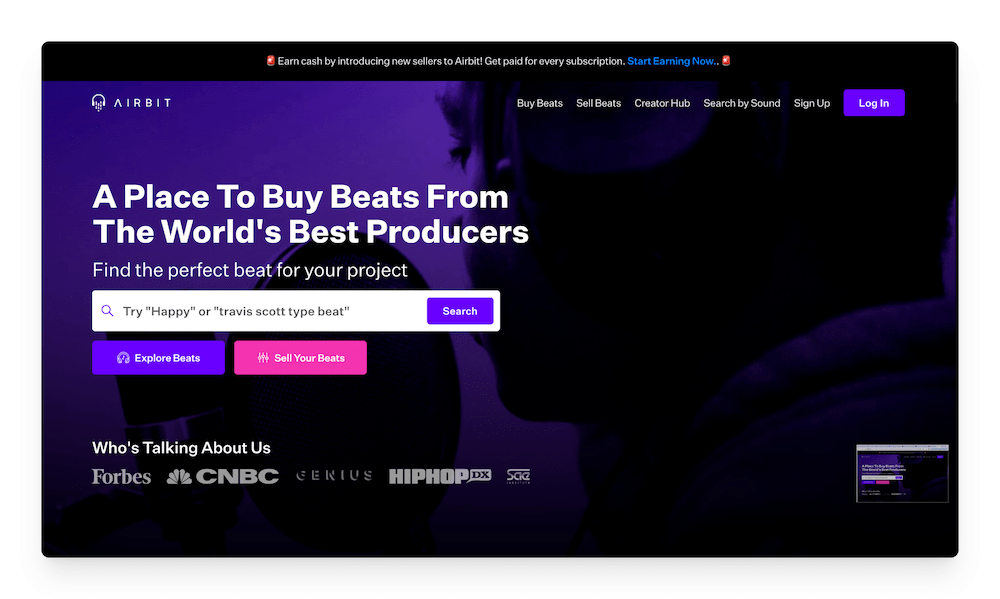
Source: Airbit
The beauty of beat sales is passive income—once a beat is made and uploaded, it can keep selling without additional effort!
Just be sure to focus on quality, consistency, and having a signature sound. You can use social media to attract buyers, collaborate with vocalists for demos, and optimize your track titles and tags for discoverability. Engaging visuals and branding also help you stand out in a competitive market.
11. Affiliate marketing
Speaking of passive income, affiliate marketing is another wonderful option for music-loving entrepreneurs looking to increase their income.
With this tactic, you’ll simply apply to join your favorite music affiliate programs, promote their products or services via your website or social networks, and earn commissions when shoppers click on your unique affiliate links to make a purchase.
To boost your chances of success with your affiliate marketing business, build a professional affiliate site with the Evolup solution!
Using Evolup, you can easily create and manage an affiliate site that suits your vision and your niche with a user-friendly interface. What’s more, as the platform is compatible with all affiliate programs, you’ll be able to multiply your commission-earning opportunities as much as you wish.
The solution’s artificial intelligence can assist you in generating product descriptions, translations, blog posts, lists of pros and cons, and more, simplifying your marketing efforts and saving you loads of time. In addition, built-in SEO features help your site climb the rankings on search engines like Google for more visibility.
Get started for just $10/month and enjoy a 7-day free trial!
12. DJing
Combining performance, creativity, and crowd engagement, DJing is a fun and lucrative method to make money with music. As a DJ, you’ll mix and transition between tracks live—at parties, clubs, weddings, festivals, or private events—using software, controllers, or turntables.
DJs often get paid per gig, with rates increasing as experience and demand grow. It’s a great way to build a fanbase, promote original music, and connect with other artists or venues.
If you’re new to DJing, you’ll want to invest in reliable gear and work on building a diverse, high-energy playlist. It's also important to practice blending tracks smoothly and reading the crowd.
Don’t hesitate to record and share mixes online to showcase your style. And remember that networking is key, so play local events, collaborate with other DJs, and be active on social media.
Always stay updated on music trends and keep your sets fresh!
13. Crowdfunding campaigns
Crowdfunding makes it possible for you to raise money directly from fans to fund projects like albums, music videos, or tours. Platforms like Kickstarter, Indiegogo, and GoFundMe let you pitch your idea and offer tiered rewards, such as signed merch, exclusive tracks, or VIP experiences—in exchange for contributions.
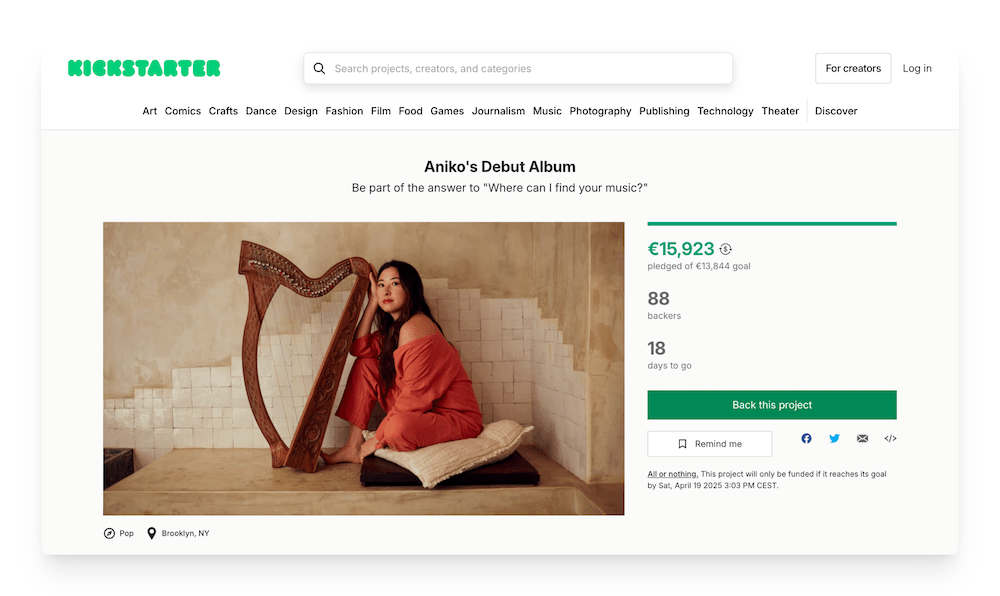
Aniko’s Debut Album on Kickstarter
With a good crowdfunding strategy, you can fund creative work without relying on labels or loans, while also building deeper connections with supporters.
To run a successful campaign, set a clear, realistic goal and craft a compelling video or story explaining your project. Offer meaningful rewards and keep backers updated throughout the process.
Aim to promote consistently via email, social media, and personal outreach. Note that gratitude and transparency go a long way—when fans feel included, they’re more likely to support you and share your campaign.
14. Twitch
The use of livestreaming platform Twitch allows musicians to make money while building a loyal, engaged fanbase. Twitch lets you perform live, host jam sessions, teach, or share behind-the-scenes content in real time.
Viewers can support you through subscriptions, tips (called “Bits” on Twitch), donations, or paid requests. It’s an interactive, low-cost strategy for monetizing your talent from home.
Although livestreaming doesn’t require a significant upfront investment, you will need to have some equipment on hand as well as basic technical skills, as you’ll be using a webcam, mic, and audio setup, and connecting with your audience through chat.
When launching a livestreaming business on Twitch, you’ll want to be sure to stream consistently and create a schedule so your audience knows when to expect you. Don’t be afraid to engage with viewers, by chatting, taking song requests, and giving shoutouts to new followers.
Remember to use good lighting and sound for a professional vibe, offering unique content that reflects your personality and music style. You can also promote your streams on Facebook, Instagram, and other networks to further spread the word.
15. Songwriting for others
Have a talent for lyrics, melodies, or hooks but don’t love the idea of being in the public eye? Songwriting for others may be a great career for you!
It involves creating songs—fully or partially—for other artists, producers, or media projects. You might work behind the scenes or collaborate directly with performers and musicians.
Successful tunes can generate revenue through upfront fees, royalties, and performance rights. It’s ideal for building industry connections and getting your song catalog heard by larger audiences, even if you’re not in the spotlight.

Photo by cottonbro studio
To ensure that your songwriting business starts off on the right track, be sure to consider the following tips:
- Build a strong song portfolio or demo reel.
- Collaborate with local artists, musician groups, producers, or vocalists.
- Join songwriting networks or organizations like ASCAP or BMI.
- Pitch to music libraries or publishers.
- Stay current with music trends and tailor song compositions to specific genres or artists.
16. Music libraries
Music libraries such as MusicBed, Pond5, and AudioJungle are platforms that license pre-made tracks for use in TV, film, ads, games, YouTube videos, etc.
They’re another excellent way to make passive income with music—once your tracks are accepted, they can generate ongoing revenue through upfront fees, royalties, and sync placements. Libraries are always looking for high-quality, versatile music in a range of genres, moods, and lengths.
You create and upload tracks that meet a library’s submission standards, often with stems or alternate versions. For the greatest likelihood of success, it’s a good idea to focus on clean production and clear emotional intent, researching what styles are in demand beforehand.
17. Podcast music creation
According to Riverside, more than 450 million people tuned into podcasts in 2023, and that number is projected to grow to 619 million by 2026. There are numerous ways to make money from podcasts, and you can take advantage of this growing popularity by harnessing your musical prowess and creating music for podcasters.
This activity can mean composing intro/outro themes, background scores, or transition stingers tailored to a show’s tone and audience.
Many podcasters seek original, professional-sounding music to enhance their brand and sound unique—making this a valuable service. You can charge per project or license tracks to multiple shows.
To attract your first clients, you’ll want to create a portfolio with sample podcast themes, perhaps offering custom packages for different budgets. You can then reach out to podcast hosts directly or use freelance platforms.
Aim to always deliver high-quality, properly mixed files and be open to revisions!
FAQ
How do you make it in the music business?
To break into the music business, you need to be aware that there is no real set of instructions on how to do it. As with any artistic profession, there are many different ways to achieve notoriety.
Moreover, in music there is a wide range of jobs and activities that allow you to gain recognition for your art and generate revenue. Musician, singer, DJ, composer, conductor, etc.
Whether you’ve taken courses and studied music or are completely self-taught, it’s possible in both cases to succeed in your endeavors.
It will require a lot of self-sacrifice, hard work, tenacity, but above all, an unwavering passion that will allow you not to count the hours while climbing the ladder of success for your project while listening carefully to the advice of musicians and professionals in the music industry.
How do you earn money as a singer?
To be able to earn money as a singer, it’s not only your voice that will count but the way you present it to the public, your brand image.
In addition to the talent for singing, many commercial levers will allow the highlighting of your productions:
- sale of albums,
- tours,
- live broadcasting to your subscribers on social media networks,
- music or singing lessons,
- private performances at special events,
- presence of your songs on a playlist followed by many listeners,
- etc.
Making money as a singer can also be done through a stage career: many artists succeed by joining musical theater companies, for example.
It’s up to you to decide what kind of music you want to offer to the public and how you want to perform on stage!
How do you make a living from your music?
Making a living from your music isn’t easy, but it’s not impossible!
Certainly, at the beginning of a career in music, it’s rather difficult to make a place for yourself with your own artistic creations when you start from scratch.
That’s why many singers and musicians start by performing well-known and recognized tunes.
This type of performance will allow you to create a community and become known locally. This won’t prevent you from composing and creating your own sounds: at the same time, try to get some time in a recording studio and get started.
Once you’re well known locally and maybe even on social networks, offer your own creations and start selling your albums. Your tracks will then earn you royalties on streaming and/or video platforms.


